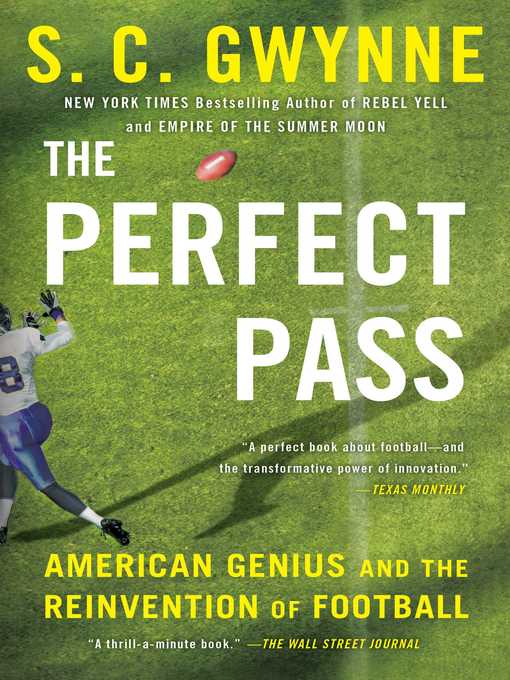
The Perfect Pass
American Genius and the Reinvention of Football
کتاب های مرتبط
- اطلاعات
- نقد و بررسی
- دیدگاه کاربران
نقد و بررسی

July 11, 2016
Even into the 1980s, passing was an almost exotic element in all levels of football, while the safe and steady running game aligned with the sport’s macho ethos. Coach Hal Mumme had other ideas, as Gwynne (Empire of the Summer Moon) writes in this excellent sports history. Mumme was fascinated with the possibilities of constantly passing and embarked on a quest to build a perfect offense, borrowing concepts from coaches and tinkering with them to fit the dream plays he scribbled on scraps of paper. His laboratories were a variety of small, overlooked high schools and colleges in Texas, Iowa, and Georgia, where a variety of small, overlooked players became statistical superstars thanks to a system that preached simplicity and repetition in a world of dictionary-sized playbooks with endless wrinkles. This offense, nicknamed “Air Raid,” made its way to big-time college ball; now, the relentlessly airborne approach has found its way to the likes of Tom Brady. Gwynne serves up an intriguing parallel history to football’s pass-dominated renovation, with Mumme playing the role of overlooked (and overworked) forefather. The author also provides an inspiring reminder that great ideas don’t automatically permeate the existing ideology. Sometimes, a devoted few must pursue their principles with diligence, even if they don’t get the glory. Agent: Amy Hughes, Dunow, Carson & Lerner.

Starred review from July 15, 2016
Think baseball is slow? Then imagine football without a passing offense, which, as historian/journalist Gwynne (Rebel Yell: The Violence, Passion, and Redemption of Stonewall Jackson, 2014, etc.) ably shows, is no mere thought experiment.In the early days of American football, quarterbacks did not have to pass the ball. The rules allowed them to, but, as the author writes, "overwhelmingly, they chose not to." Of course, this meant it was mostly a running game. There were exceptions--Carlisle Indian School coach Pop Warner's passing game being the textbook case--but it wasn't until recent years that the passing game came into its own, courtesy of Gwynne's coach heroes. Hal Mumme and his assistant Mike Leach led the small, not terribly distinguished school of Iowa Wesleyan to legendary status by developing a fast passing game that admitted only a few variations: "Hal's ultra-minimal playbook," writes the author, "allowed the quarterback and receivers to repeat it hundreds of times in practice." The explanation that follows is a touch geeky, with mathematical variants based on man-to-man coverage in the classic Y-cross formation, and so forth, but that makes this book just the thing for the true football aficionado in the house. What makes the narrative more generally invaluable is its portrait of how football politics can bring down even the winningest coach. Although every team on the planet now emulates the playbook developed by the two coaches--a playbook that of course has a genealogy stretching back into football history--their own careers went into a downward spiral (beg pardon) when their numbers didn't post well. Still, it is undeniable that the Air Raid, the fast passing game, and the frequency of the forward pass are now imprinted on football, especially, as Gwynne notes, on the college level though also in the NFL. That makes his subtitle all the more fitting, for undeniably, the two coaches changed the game--and brought glory to their institutions. A superb treat for all gridiron fans.
COPYRIGHT(2016) Kirkus Reviews, ALL RIGHTS RESERVED.

August 1, 2016
This book by Pulitzer Prize finalist Gwynne (Empire of the Summer Moon) is not only about the evolution of football strategy, particularly in the passing game, it also illuminates the challenges and rigors of college football coaching and its effect on family life. The story is told through the experiences of itinerant football coach Hal Mumme, who rose from high school assistant coach in Texas to head coach of University of Kentucky in the vaunted Southeastern Conference to his current position as head coach of Belhaven University after four tumultuous years in Lexington. Mumme, along with his chief assistant Mike Leach who has forged his own nomadic college coaching career, developed the Air Raid offense that is prominent in the present game. Mumme's simple, fast-paced, pass-oriented attack draws inspirations from plays such as the run and shoot offense, the single-back offense, and legendary football coach Bill Walsh's West Coast offense. Diagrams make the technical aspects clear and understandable. Despite his innovative role in the sport, Mumme now languishes in the lower depths of NAIA (National Association of Intercollegiate Athletics) football, a prophet without honor in his own country. VERDICT This interesting amalgamation of football strategy and biography will interest all fans of the sport.
Copyright 2016 Library Journal, LLC Used with permission.

September 1, 2016
A perennial conference doormat in football in the mid-1980s, a desperate, financially ailing Iowa Wesleyan University took a flier on young high-school coach Hal Mumme, who quickly implemented a series of cutting-edge changes: he trimmed an oversized playbook to a mere 15 pass plays and 6 rushing plays, and he built his entire offense on the short pass, then plugged in a quarterback of average arm strength who could nevertheless throw often and with deadly accuracy. Decades ahead of his time, Mumme (pronounced mummy ) eliminated hard contact and such ponderous drills as windsprints and pushups in team practices, all of which injected, well, joy into his players' training. While it's a little unclear how many of Mumme's changes were entirely new, or came from like-minded coaches he consulted (the legendary Bill Walsh was one), Pulitzer Prize finalist Gwynne (Empire of the Summer Moon, 2010) still delivers a rousing tale of innovation finding success in the face of the gale-force winds of convention.(Reprinted with permission of Booklist, copyright 2016, American Library Association.)

























دیدگاه کاربران